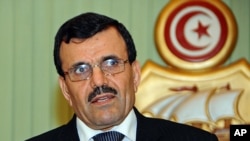Tunisia's Islamist prime minister sought to assure the opposition Wednesday that his government still intends to resign, once it has completed negotiations aimed at forming a caretaker government.
Prime Minister Ali Larayedh spoke Wednesday in Tunis, saying the stepdown will follow the dictates of a transitional roadmap first reported late last month.
Ahead of the prime minister's address, thousands of people in the capital protested on the second anniversary of elections that brought Mr. Larayedh's moderate Islamist Ennahda party to power. Protest organizers told reporters that Wednesday's demonstration was aimed at maintaining pressure on the government to keep its earlier resignation promise.
In September, Tunisia's powerful UGTT labor union, which has been mediating talks between the government and the opposition, said the ruling party had agreed to three weeks of negotiations, before yielding to a transitional administration and eventual elections.
The Ennahda party won 2011 elections that followed the ouster of longtime president Zine el-Abidine Ben Ali in a popular uprising earlier that year. But it has since faced mass protests led by secular opposition groups that accuse the party of trying to impose an Islamist agenda on one of the Muslim world's most secular countries.
Meanwhile, Tunisia's economy has languished and the Larayedh government has faced a rise in attacks by al-Qaida-linked militants, including a shootout Wednesday between police and Islamists in the country's troubled south. At least six police and two Islamists were reported killed in the clash.
Prime Minister Ali Larayedh spoke Wednesday in Tunis, saying the stepdown will follow the dictates of a transitional roadmap first reported late last month.
Ahead of the prime minister's address, thousands of people in the capital protested on the second anniversary of elections that brought Mr. Larayedh's moderate Islamist Ennahda party to power. Protest organizers told reporters that Wednesday's demonstration was aimed at maintaining pressure on the government to keep its earlier resignation promise.
In September, Tunisia's powerful UGTT labor union, which has been mediating talks between the government and the opposition, said the ruling party had agreed to three weeks of negotiations, before yielding to a transitional administration and eventual elections.
The Ennahda party won 2011 elections that followed the ouster of longtime president Zine el-Abidine Ben Ali in a popular uprising earlier that year. But it has since faced mass protests led by secular opposition groups that accuse the party of trying to impose an Islamist agenda on one of the Muslim world's most secular countries.
Meanwhile, Tunisia's economy has languished and the Larayedh government has faced a rise in attacks by al-Qaida-linked militants, including a shootout Wednesday between police and Islamists in the country's troubled south. At least six police and two Islamists were reported killed in the clash.





